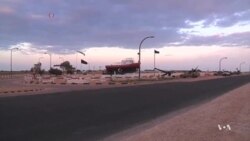LONDON —
Ali Zeidan was forced to stand down as Libya’s prime minister this week after rebel forces in the east successfully exported oil via a North Korean flagged tanker - despite assurances from the government that naval forces were in control. Zeidan’s resignation plunges Libya back into political crisis, and there are growing fears of an escalation in conflict between rival rebel militias.
Rebel forces in the eastern port of Sidra had loaded an estimated 234,000 barrels of crude, worth around $24 million, onto the North Korean-flagged tanker Morning Glory. The vessel left the oil terminal Monday and managed to evade a naval blockade.
It was a humiliation for Prime Minister Ali Zeidan, who had vowed to bomb the tanker if it left Libya. Parliament voted to oust him Tuesday.
Leadership void
Zeidan did not retain the loyalty of many members of the government or armed forces, according to Jason Pack, researcher of Libyan history at Cambridge University.
"Former Prime Minister Zeidan is actually not the commander-in-chief of the Libyan armed forces. That role would have been fulfilled by the General National Congress President, Nuri Abu Sahmein, who as an Islamist is an opponent of Ali Zeidan,” said Pack.
Zeidan’s interim successor, former Defense Minister Abdallah Al-Thinni was sworn in Wednesday. On the streets of Tripoli, the prime minister’s resignation was largely welcomed.
Abdullah Maslaty, a resident in the capital, said that Ali Zeidan did nothing for the country. “He's been in power for a year and three months, and achieved nothing."
Rival rebebl militias
Tripoli-based political analyst Salah Elbakoush said Libya’s central government is failing to function. “Government institutions performed really bad. And you see thousands of employees, they are 80 percent overstaffed,” he said.
The Tripoli government has given rebels in the east a two-week ultimatum to stop blockading the oil terminals, or face a military assault. But the rebels have faced down such government threats many times before, says Cambridge analyst Jason Pack.
"The situation is awful because sub-state actors have shown that they can undermine the resolve of the central government, and sell pirated oil on the international scene, which sets the stage for conflict between stronger sub-state actors and the weaker Libyan state,” said Pack.
The eastern rebels, led by Ibrahim Jathran, want greater autonomy for their region, known as Cyrenaica. But they face rival rebel groups and Islamist factions.
“Right now we’re seeing battles in Sirte between Jathran’s federalist forces, and Misratan and Islamist militias," said Pack. "So Jathran is likely to lose in any direct military confrontation, he does not have the forces he promises himself to have. However, there is a danger for a kind of regional war that would polarize more the east and the west in Libya.”
Nearly three years after the ouster of former dictator Moammar Gadhafi, there are growing fears the political vacuum could breed further conflict.
Rebel forces in the eastern port of Sidra had loaded an estimated 234,000 barrels of crude, worth around $24 million, onto the North Korean-flagged tanker Morning Glory. The vessel left the oil terminal Monday and managed to evade a naval blockade.
It was a humiliation for Prime Minister Ali Zeidan, who had vowed to bomb the tanker if it left Libya. Parliament voted to oust him Tuesday.
Leadership void
Zeidan did not retain the loyalty of many members of the government or armed forces, according to Jason Pack, researcher of Libyan history at Cambridge University.
"Former Prime Minister Zeidan is actually not the commander-in-chief of the Libyan armed forces. That role would have been fulfilled by the General National Congress President, Nuri Abu Sahmein, who as an Islamist is an opponent of Ali Zeidan,” said Pack.
Zeidan’s interim successor, former Defense Minister Abdallah Al-Thinni was sworn in Wednesday. On the streets of Tripoli, the prime minister’s resignation was largely welcomed.
Abdullah Maslaty, a resident in the capital, said that Ali Zeidan did nothing for the country. “He's been in power for a year and three months, and achieved nothing."
Rival rebebl militias
Tripoli-based political analyst Salah Elbakoush said Libya’s central government is failing to function. “Government institutions performed really bad. And you see thousands of employees, they are 80 percent overstaffed,” he said.
The Tripoli government has given rebels in the east a two-week ultimatum to stop blockading the oil terminals, or face a military assault. But the rebels have faced down such government threats many times before, says Cambridge analyst Jason Pack.
"The situation is awful because sub-state actors have shown that they can undermine the resolve of the central government, and sell pirated oil on the international scene, which sets the stage for conflict between stronger sub-state actors and the weaker Libyan state,” said Pack.
The eastern rebels, led by Ibrahim Jathran, want greater autonomy for their region, known as Cyrenaica. But they face rival rebel groups and Islamist factions.
“Right now we’re seeing battles in Sirte between Jathran’s federalist forces, and Misratan and Islamist militias," said Pack. "So Jathran is likely to lose in any direct military confrontation, he does not have the forces he promises himself to have. However, there is a danger for a kind of regional war that would polarize more the east and the west in Libya.”
Nearly three years after the ouster of former dictator Moammar Gadhafi, there are growing fears the political vacuum could breed further conflict.





